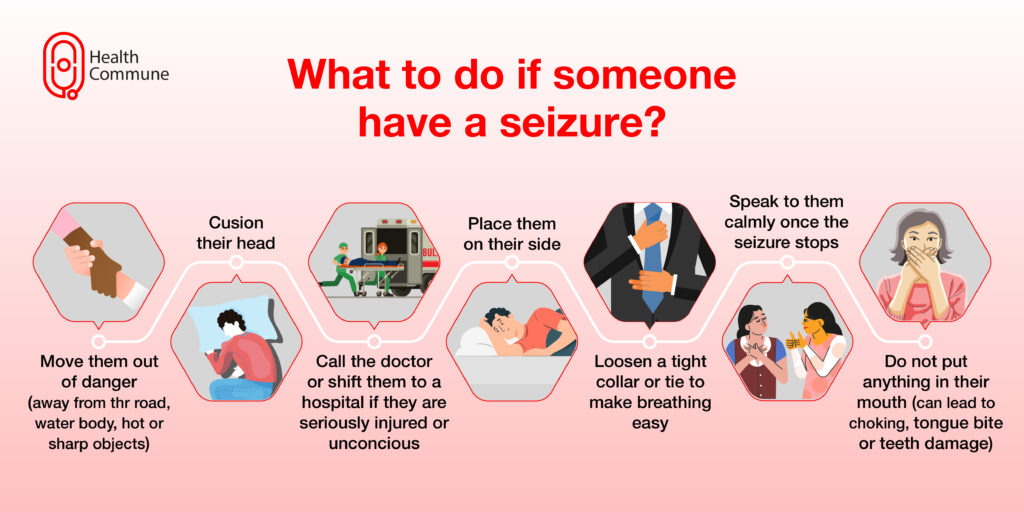Are seizures and epilepsy the same? Read to learn about their differences, types, symptoms, treatment, and what to do if you see someone having convulsions.
What is epilepsy?
Epilepsy is a neurological condition in which there is abnormal electrical activity in the brain. This results in convulsions, unusual sensations, behaviour, and changes in levels of consciousness.
What is a seizure?
A seizure is an episode of convulsions or violent fits of movement, alteration in awareness, unusual behaviour, sensations, etc. due to abnormal electrical activity in the brain.
What is the difference between seizure and epilepsy?
A seizure is a single occurrence of convulsions, unusual sensations, behaviour, memory, and changes in awareness. If two or more seizure episodes occur more than 24 hours apart without a known trigger (unprovoked), then it is called epilepsy.
What causes epilepsy?
The causes of epilepsy include:
- Genetic factors or a positive family history
- Severe head injury
- Infections in the brain
- Stroke
- Brain cancer
- Alcohol or drug abuse
- Alzheimer’s disease
Causes of seizures without epilepsy are:
- Disturbances in the level of electrolytes such as sodium, calcium or if blood sugar levels are low
- High fever
- Lack of sleep
What are the symptoms of epilepsy?
- Convulsions (sudden alteration in consciousness with violent jerking movements of the arms and legs)
- Blank staring
- Loss of consciousness or awareness
What are the types of epilepsy?
Generalised seizures: These types of seizures involve all areas of the brain. There are 6 subtypes:
- Absence seizures: Typically occurring in children. The affected individual blankly stares into space with or without minor body movements such as blinking of the eyes or smacking of the lips. This type of seizure lasts only for 5-10 seconds, but multiple episodes usually occur throughout the day
- Tonic seizures: This is characterised by the stiffening of muscles, causing the patient to fall to the ground, usually backwards
- Atonic seizures: In this, there is a sudden loss of muscle control and the person collapses and falls forwards
- Clonic seizures: This is associated with jerking movements of the arms, neck and face
- Myoclonic seizures: There are sudden brief jerks or twitches of muscles in the upper body, arms and legs. These usually occur only for a fraction of a second
- Tonic-clonic seizures: In this type of seizure, there is a sudden loss of consciousness with stiffening of the body and abnormal jerking movements of arms and legs. Sometimes the person may lose control of the bladder or bite their tongue
What precautions do I need to take to prevent epilepsy?
- Take your medications regularly and on time
- Manage stress by getting enough sleep, exercising and practising relaxation techniques
- Avoid flashing lights
- Take adequate precautions to protect yourself from any kind of injuries to head
- Avoid alcohol
- If your child has a fever or infection, consult a doctor at the earliest
- If you are taking medicines for diabetes, eat your food on time to avoid low blood sugar levels

What precautions should I take if I'm pregnant with epilepsy?
Pregnant women with epilepsy need to exercise special caution. Seizures during pregnancy can lead to:
- Decreased heartbeat of the baby
- Decreased oxygen supply to the baby
- Premature birth
- If you fall due to the seizure, it could injure the foetus and may even cause a loss of pregnancy
Inform your obstetrician about your epilepsy since : - The medicines that you are taking can impact the development of your baby. Consult your doctor to know if you need to modify your prescription
- If you have a seizure while pregnant, consult your doctor immediately to monitor your medicine doses and evaluate your baby’s well-being
Most women who have epilepsy deliver healthy babies without any mishaps. Seizures are uncommon during childbirth. If you have an episode, it might be controlled through intravenous (IV) medicines. Your doctor might perform a C-section delivery if the seizure lasts a long period.
How is epilepsy diagnosed?
If you report to your doctor with a history of seizures, you will initially be asked about the details of your episode. This helps them confirm the diagnosis and identify the type of seizure. Additionally, recommended tests include:
- EEG (Electroencephalogram): This records the electrical activity in the brain
- Brain scans: These include CT, MRI, and PET scans, which are useful in detecting any underlying problems or conditions affecting the brain
What are the treatments for epilepsy?
Timely treatment significantly helps patients return to their routine lives and drastically reduces the chances of future seizures.
- If there is any underlying cause for epilepsy (for example, alcoholism, low blood sugar level, fever, or infections), identifying and correcting them will resolve the condition
- Anti-epileptic medications, can prevent and reduce the instances of seziures
- Surgery, to remove a small part of the brain that is leading to epilepsy
- Deep brain stimulation: In this, small electrodes are inserted into certain areas of the brain to reduce the frequency of seizures
Are there any side effects to the medications that I take for epilepsy?
Some of the common side-effects of anti-epileptic medicines are :
- Drowsiness
- Swelling and enlargement of the gums
- Headaches
- Rashes
- Shaking (tremors)
If I see someone having a seizure episode, what do I do?
Move them out of danger (away from the road, water body, hot or sharp objects)
- Cushion their head
- Place them on their side
- Loosen a tight collar or tie to make breathing easy
- Speak to them calmly once the seizure stops
- Call the doctor or shift them to a hospital if they are seriously injured or aren’t regaining consciousness
- Do not put anything in their mouth. This can lead to choking, tongue bite, or tooth damage




